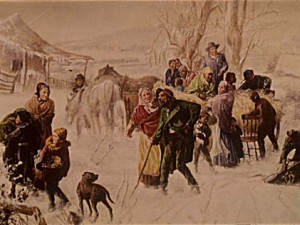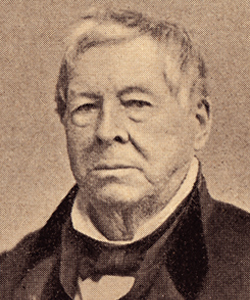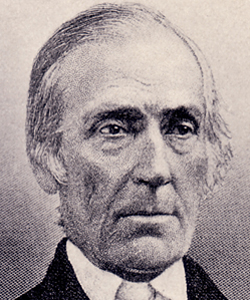 PBS did a four part series on slavery in America with supplemental narratives and teacher’s guides online. One of the parts is Judgement Day focusing on 1831-1865. The segment of the narrative about the Underground Railroad mentions several people that can be found on House Divided.
PBS did a four part series on slavery in America with supplemental narratives and teacher’s guides online. One of the parts is Judgement Day focusing on 1831-1865. The segment of the narrative about the Underground Railroad mentions several people that can be found on House Divided.
8
Jul
08
PBS Program on Slavery
Posted by Published in Antebellum (1840-1861), Lesson Plans, Video Themes: Slavery & Abolition8
Jul
08
Abolition: The Religious Dimension
Posted by Published in Antebellum (1840-1861), Recent Scholarship Themes: Religion & Philosophy, Slavery & Abolition Abolition in the United States, like in Great Britain, had religious inspirations. Some of the first and most outspoken abolitionists were members of the religious Society of Friends, or Quakers. Benjamin Lay addressed the Yearly meeting of Quakers on the subject of abolishing slavery as early as 1738. Quakers continued their support for abolition throughout the nineteenth century, an example found prominently in Thomas Garrett, a Quaker merchant who helped countless escaped slaves to freedom as a “stationmaster” on the Underground Railroad. In Great Britain, evangelical Anglicans John Newton, Thomas Clarkson among others pressured Parliament for the abandonment of the slave trade. Abolitionism on both sides of the Atlantic carried a religious dimension that should not be ignored in any study of the movement.
Abolition in the United States, like in Great Britain, had religious inspirations. Some of the first and most outspoken abolitionists were members of the religious Society of Friends, or Quakers. Benjamin Lay addressed the Yearly meeting of Quakers on the subject of abolishing slavery as early as 1738. Quakers continued their support for abolition throughout the nineteenth century, an example found prominently in Thomas Garrett, a Quaker merchant who helped countless escaped slaves to freedom as a “stationmaster” on the Underground Railroad. In Great Britain, evangelical Anglicans John Newton, Thomas Clarkson among others pressured Parliament for the abandonment of the slave trade. Abolitionism on both sides of the Atlantic carried a religious dimension that should not be ignored in any study of the movement.
In his blog, “Underground Railroad: Myth & Reality,” Fergus Bordewich explores the religious roots of the antislavery movement. Bordewich points to the Great Awakening as a main catalyst for growth of antislavery sentiment.
The National Humanities Center presents an essay on the topic of religion and antislavery movements as well. The essay by Bertram Wyatt-Brown goes into greater detail than Bordewich’s blog post, includes a classroom discussion guide, and a brief bibliography. Wyatt-Brown writes with a teacher audience in mind. The essay serves as much to introduce and explore the connection between abolition and religion as to provoke discussion and provide teacher resources. Certainly a worthwhile resource.
Wyatt-Brown’s essay is part of a larger TeacherServe webpage provided by the National Humanities Center. Additional essays on religion in America are provided, along with essays and materials exploring the environment in American history, and teaching African American history.
8
Jul
08
 Author Fergus Bordewich’s “Bound for Canaan” traces the abolition movement from 1790 to the eve of the Civil War, primarily through the Underground Railroad. Bordewich writes that the Underground Railroad “…occupies a romantic place in the American imagination that is shared by only a few episodes in the nation’s history: the Lewis and Clark expedition, for instance, the California Gold Rush, the Indian wars, and a handful of others.” (Bound for Canaan, 3) And perhaps because of its position in the American consciousness, the memory of the Underground Railroad, like so many other prominent historical events, is checkered with truths and untruths. Was the Underground Railroad a consistently clandestine operation? Are clever codes and hiding places all there is to amaze the modern student of the Underground Railroad? Indeed, secrecy, codes, and hiding places all had their part in the Underground Railroad, but a concentration on these has served to give birth to myths clouding the truth of the movement.
Author Fergus Bordewich’s “Bound for Canaan” traces the abolition movement from 1790 to the eve of the Civil War, primarily through the Underground Railroad. Bordewich writes that the Underground Railroad “…occupies a romantic place in the American imagination that is shared by only a few episodes in the nation’s history: the Lewis and Clark expedition, for instance, the California Gold Rush, the Indian wars, and a handful of others.” (Bound for Canaan, 3) And perhaps because of its position in the American consciousness, the memory of the Underground Railroad, like so many other prominent historical events, is checkered with truths and untruths. Was the Underground Railroad a consistently clandestine operation? Are clever codes and hiding places all there is to amaze the modern student of the Underground Railroad? Indeed, secrecy, codes, and hiding places all had their part in the Underground Railroad, but a concentration on these has served to give birth to myths clouding the truth of the movement.
Bordewich addresses the issues of myth and reality in the Underground Railroad in “Bound for Canaan,” but for a more succinct discussion of the issue, one can turn to the author’s blog. A post from July of 2005 examines the truth of the Underground Railroad in accessible, informative prose, and serves as a fine introduction and springboard for further investigation of the issue. Certainly worth reading.
7
Jul
08
Documenting the American South
Posted by sailerd Published in Antebellum (1840-1861), Letters & Diaries, Rare Books Themes: Slavery & Abolition If your class is going to study the Underground Railroad, one website you should check out is Documenting the American South (DocSouth). The University of North Carolina at Chapel Hill has put together a great collection of primary sources, including slave narratives published before 1920. To see a list of what they have available, go here. Besides the full text of books, DocSouth has great supplementary material for almost every title. On Frederick Douglass, for example, the site provides a short biography and related primary sources. While students may be familiar with Douglass or Harriet Tubman, they can find on DocSouth many new interesting stories from fugitive slaves like Solomon Northup and William Wells Brown.
If your class is going to study the Underground Railroad, one website you should check out is Documenting the American South (DocSouth). The University of North Carolina at Chapel Hill has put together a great collection of primary sources, including slave narratives published before 1920. To see a list of what they have available, go here. Besides the full text of books, DocSouth has great supplementary material for almost every title. On Frederick Douglass, for example, the site provides a short biography and related primary sources. While students may be familiar with Douglass or Harriet Tubman, they can find on DocSouth many new interesting stories from fugitive slaves like Solomon Northup and William Wells Brown.
7
Jul
08
Levi Coffin: President of the Underground Railroad
Posted by Published in Antebellum (1840-1861), Lesson Plans, Places to Visit Themes: Slavery & Abolition I found Levi Coffin, a leader of the Underground Railroad in Indiana, as I was going through the database today and the role that he played in the Underground Railroad. Upon further research I found this great website created by Wayne County. There are several pictures of the Levi Coffin House and where the Coffins used to hide the thousands of slaves that came through Indiana on their way to Canada. The site includes several links to other sites about Levi Coffin and other Underground Railroad characters. One link I thought was very useful was to K-12 Lesson Plan link.
I found Levi Coffin, a leader of the Underground Railroad in Indiana, as I was going through the database today and the role that he played in the Underground Railroad. Upon further research I found this great website created by Wayne County. There are several pictures of the Levi Coffin House and where the Coffins used to hide the thousands of slaves that came through Indiana on their way to Canada. The site includes several links to other sites about Levi Coffin and other Underground Railroad characters. One link I thought was very useful was to K-12 Lesson Plan link.
2
Jul
08
The Civil War in Carlisle
Posted by Published in Civil War (1861-1865), Images, Recent Scholarship Themes: Battles & Soldiers, Carlisle & Dickinson In the summer of 1863, the town of Carlisle, PA became the one of the northern-most posts of the Confederate Army. An account of the occupation of Carlisle during the Battle of Gettysburg by Richard Edling appears on civilwaralbum.com. 145 years ago this week, Dickinson College became host to General Ewell’s troops. Edling provides modern day pictures of the Civil War sites in Carlisle. Check out House Divided for images of Dickinson College from the Civil War.
In the summer of 1863, the town of Carlisle, PA became the one of the northern-most posts of the Confederate Army. An account of the occupation of Carlisle during the Battle of Gettysburg by Richard Edling appears on civilwaralbum.com. 145 years ago this week, Dickinson College became host to General Ewell’s troops. Edling provides modern day pictures of the Civil War sites in Carlisle. Check out House Divided for images of Dickinson College from the Civil War.
1
Jul
08
Lincoln Douglas in 1854
Posted by sailerd Published in Antebellum (1840-1861), Historic Periodicals Themes: Contests & Elections I want to point out an article that the Chicago Press & Tribune published on July 1, 1858. Almost two months before the first 1858 debate between Abraham Lincoln and Stephen Douglas, the Tribune provided an account of the exchange between those two Illinois politicians in October 1854. Even though the Tribune described the event “from memory,” some might still find the article an interesting read.
I want to point out an article that the Chicago Press & Tribune published on July 1, 1858. Almost two months before the first 1858 debate between Abraham Lincoln and Stephen Douglas, the Tribune provided an account of the exchange between those two Illinois politicians in October 1854. Even though the Tribune described the event “from memory,” some might still find the article an interesting read.
27
Jun
08
“But will the election of Mr. Lincoln endanger the Union?”
Posted by sailerd Published in Antebellum (1840-1861), Historic Periodicals Themes: Contests & ElectionsThe Atlantic’s archive also has selected full text articles published between 1857 and November 1995. While a number of interesting articles are available, I wanted to point out one from the October 1860 issue. A month before the November 1860 election, James Russell Lowell discussed the four candidates and potential outcomes. Lowell realized that “this election [was] a turning-point in our history” because “[even though] there [were] four candidates, there [were] really…two parties, and a single question that divides them.” While many Americans were concerned about a Republican victory, Lowell concluded that Abraham Lincoln “[had] proved both his ability and his integrity” and his party “[had] no hostility to the South.” While thisarticle is a long one, some might be able to use it in their classes.
27
Jun
08
Everyday Life in the Civil War
Posted by Published in Civil War (1861-1865), Images, Letters & Diaries, Maps, Rare Books Themes: Battles & Soldiers CivilWarHome.com is a great site with a ton of information on life during the civil war. Their main page is separated in several categories including Medicine, Biographies, and Essays each with numerous links and descriptions for subcategories.
CivilWarHome.com is a great site with a ton of information on life during the civil war. Their main page is separated in several categories including Medicine, Biographies, and Essays each with numerous links and descriptions for subcategories.
26
Jun
08
Civil Liberties: Then and Now
Posted by Published in Civil War (1861-1865), General Opinion, Recent News, Video Themes: Laws & LitigationThe issue of civil liberties during wartime is as crucial today as it was during the Civil War. The detention of suspected terrorists in Guantanamo Bay prison has led to endless debate and confusing equivocation regarding the rights of detainees and civil liberties during war time. The confusion is nothing new. Curbing civil liberties during war time is something the United States experienced not only in the Civil War, but also in World Wars One and Two. Is the introduction of internal securities measures curbing civil liberties ever justified? Is it necessary? Civil War historian and Pulitzer Prize-winning author Mark Neely took some time to answer these questions for the House Divided project at our June 13th workshop.
The Heritage Foundation, a conservative political think-tank, examines Lincoln’s restrictions of civil liberties during the War. The Hon. Frank J. Williams uses his article to examine also the restriction of civil liberties enacted by the Bush Administration as a part of the War on Terror. Williams acknowledges the unique situation of the rebellion faced by the Federal government during the 1860s, and draws a parallel between the uniqueness of that era and that of our current war.







